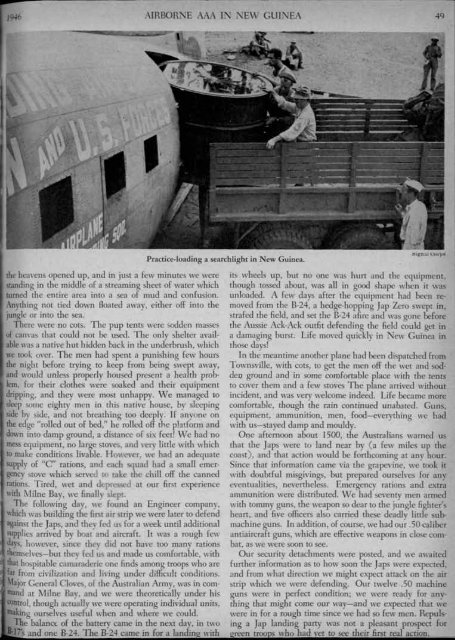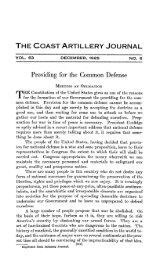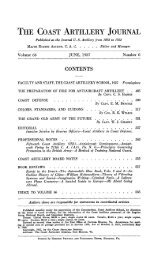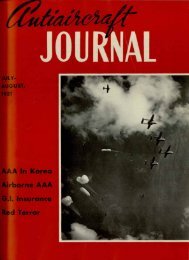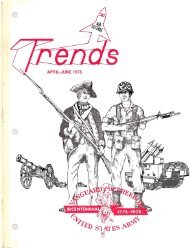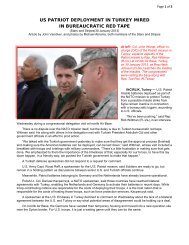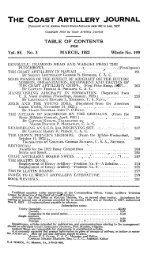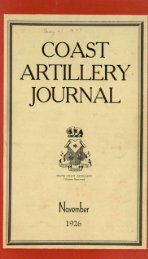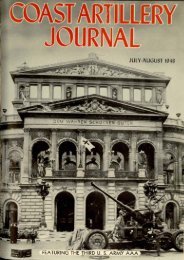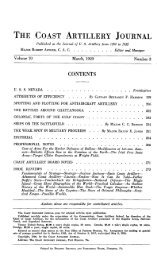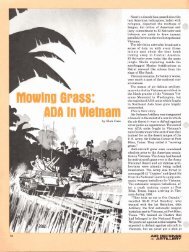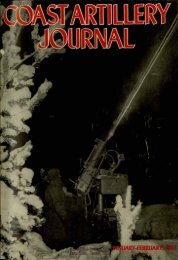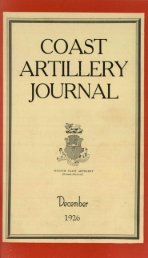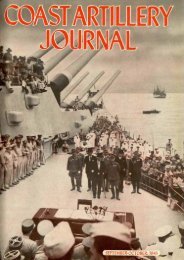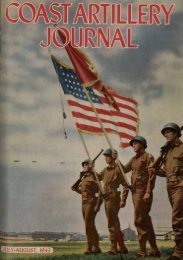January-February - Air Defense Artillery
January-February - Air Defense Artillery
January-February - Air Defense Artillery
Create successful ePaper yourself
Turn your PDF publications into a flip-book with our unique Google optimized e-Paper software.
1946 :\IRBOR~E AAA I~ NEW GlII~EA<br />
Practice-loading a searchlight in New Guinea.<br />
the heavens opened up, and in just a few minutes we were<br />
standing in the middle of a streaming sheet of water which<br />
turned the entire area into a sea of mud and confusion.<br />
Anything not tied down floated away, either off into the<br />
jungle or into the sea.<br />
There were no cots. The pup tents were sodden masses<br />
of canvas that could not be used. The only shelter available<br />
was a native hut hidden back in the underbrush, which<br />
we took over. The men had spent a punishing few hours<br />
the night before trying to keep from being swept away,<br />
and would unless properly housed present a health problem,<br />
for their clothes were soaked and their equipment<br />
dripping, and they were most unhappy. \Ve managed to<br />
sleep some eighty men in this native house, by sleeping<br />
side by side, and not breathing too deeply. If anyone on<br />
the edge "rolled out of bed," he rolled off the pla~form and<br />
down into damp ground, a distance of six feet! \t\1e had no<br />
messequipment, no large stoves, and very little with which<br />
to make conditions livable. However, we had an adequate<br />
supply of "c" rations, and each squad had a small emergency<br />
stove which served to take the chill off the canned<br />
rations. Tired, wet and depressed at our first experience<br />
with Milne Bay, we finally slept.<br />
The following day, we found an Engineer company,<br />
whichwas building the first air strip we were later to defend<br />
against the Japs, and they fed us for a week until additional<br />
supplies arrived by boat and aircraft. It was a rough few<br />
days, however, since they did not have too many rations<br />
themselves-but they fed us and made us comfortable, with<br />
thathospitable camaraderie one finds among troops who are<br />
far from civilization and living under difficult conditions.<br />
MajorGeneral Cloves, of the Australian Army, was in command<br />
at Milne Bay, and we were theoretically under his<br />
COntrol, though actually we were operating individual units,<br />
making ourselves useful when and where we could.<br />
The balancL of the battery came in the next day, in two<br />
7's and one B-24. The B-24 came in for a landing with<br />
its wheels up, but no one was hurt and the equipment.<br />
though tossed about, was all in good shape when it was<br />
unloaded. A few days after the equipment had been removed<br />
from the B-24, a hedge-hopping Jap Zero swept in,<br />
strafed the field, and set the B-24 afire and was gone before<br />
the Aussie Ack-Ack outfit defending the field could get in<br />
a damaging burst. Life moved quickly in New Guinea in<br />
those davs!<br />
In th~ meantime another plane had been dispatched from<br />
Townsville, with cots, to get the men off the wet and soddeo<br />
ground and in some comfortable place with the tents<br />
to cover them and a few stoves The plane arrived without<br />
incident, and was very welcome indeed. Life became more<br />
comfortable, though the rain continued unabated. Guns,<br />
equipment, ammunition, men, food-everything we had<br />
with us-stayed damp and mouldy.<br />
One afternoon about 1500, the Australians warned us<br />
that the Japs were to land near by ea few miles up the<br />
coast), and that action would be forthcoming at any hour.<br />
Since that information came via the grapevine, we took it<br />
with doubtful misgivings, but prepared ourselves for any<br />
eventualities, nevertheless. Emergency rations and extra<br />
ammunition were distributed. \Ve had seventy men armed<br />
with tommy guns, the weapon so dear to the jungle fighter's<br />
heart,. and five officers also carried these deadly little submachine<br />
guns. In addition, of course, we had our .50-caliber<br />
antiaircraft guns, which are effective weapons in close combat,<br />
as we were soon to see.<br />
Our security detachments were posted, and we awaited<br />
further information as to how soon the Japs were expected,<br />
and from what direction we might expect attack on the air<br />
strip which we were defending. Our twelve .50 machine<br />
guns were in perfect condition; we were ready for anything<br />
that might come our way-and we expected that we<br />
were in for a rough time since we had so few men. Repulsing<br />
a Jap landing party was not a pleasant prospect for<br />
green troo s who had vet to see their nrst real action.


